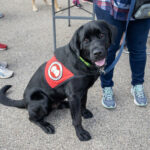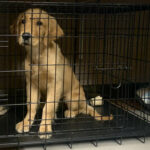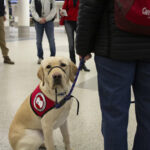Can Do Canines Program Standards
Equipment
Can Do Canines strives to teach every dog the value of keeping a loose leash while walking, for both control and safety purposes. We believe that dogs can be taught to walk nicely through positive reinforcement and consistent handling, along with the approved tools described here.
- Please use only 4 to 6' leashes—no retractable or European-style body leashes.
- Use only plain or martingale-type buckle or clip collars.
- Gentle Leaders and Haltis may be introduced after the dog reaches 5 months of age.
- Halti front-clip body harnesses may be used for dogs 12 months and up.
- Long lines and tie-outs may be used to help exercise or train dogs, as long as the dog is always directly supervised.
- Training capes will be provided to volunteers committing to longer-term care of a dog once the volunteer has received Public Access Training.
- Vehicle harnesses or tethers attached to collars must be used when transporting program dogs over 25 pounds.
Safety
Crating
Household
Handling









